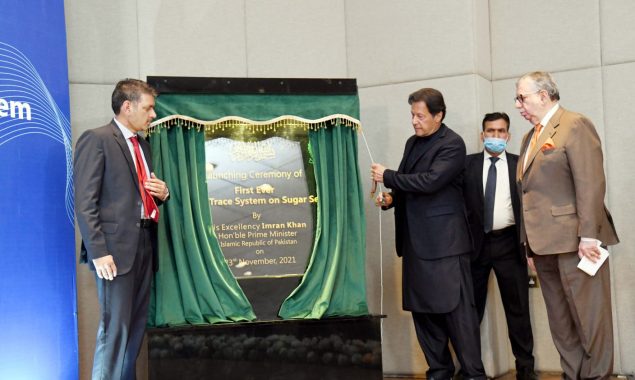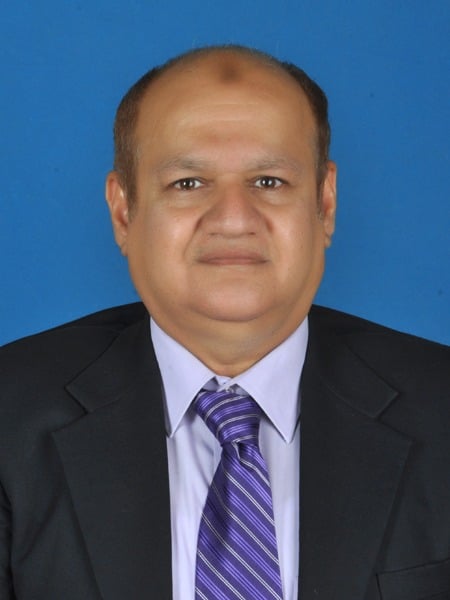
Photo Courtesy: Staff Reporter
ISLAMABAD: Prime Minister Imran Khan on Tuesday unveiled the Federal Board of Revenue’s (FBR) Track and Trace System on sugar sector and expressed the hope that it will help broaden the tax base and address the legitimate tax-related issues of the sugar industry.
In a historic development and a special ceremony organised at the Prime Minister’s Office, the premier called the rollout of the Track and Trace System (TTS) a watershed event in the development of Pakistan’s economy and expressed the hope that it would lead to the much-needed economic prosperity in the times to come.
“It is an integrated, technology-based solution that shall ensure accurate reporting of production volumes through real-time monitoring of manufacturing by affixation of tax stamps, improve quality control and; thus, ensure increased revenue collection,” he added.
At the time of assuming office, the government had inherited a dismal economic situation, and was confronted with multiple challenges, the prime minister said, adding: “Our revenue collection system was one of the weakest in the world, with a chronically low tax-to-GDP ratio. We were unable to effectively mobilise our own resources for the wellbeing of the people.”
Prime Minister Imran Khan emphasised that the present government was committed to bring about change and putting Pakistan on the path of self-sufficiency and, in this regard, the pivotal role of the FBR could not be over-emphasised.
“One of our immediate priorities was to identify how to improve the monitoring mechanism and increase revenue collection,” he said.
The present government is the first one to break the nexus of tax evaders, vested interests and mafias.
“We have not been afraid of taking difficult decisions nor shied away from plugging loopholes by enacting legislation that restricts corrupt practices and ensures transparency and fairness,” he said.
“The vested interests resisted the drive and efforts to improve regulatory oversight of the economy, despite knowing that without sound economic practices and enhanced revenue collection, we would not be able to allocate funds for human development, infrastructural improvement, health, and education.”
One of the central tenets of the present government’s economic policy has been to bring about increased digitalisation and automation of the entire tax apparatus as a means to reduce opportunities for graft, coercion and theft.
“[The] Track and Trace System will serve as a central pillar of that economic policy and shall revolutionise [the] tax collection across Pakistan,” he added.
The prime minister said the previous governments had made halfhearted attempts to introduce the TTS but despite five attempts over a period of a decade, they were unable to implement the same.
“We too faced a monumental challenge in our attempt to bring about this paradigm shift and a barrage of lawsuits and threats; however, we persevered and were able to counter the legal challenges because of a robust policy and regulatory framework, which provided the relevant guidelines for our decision making,” he added.
In the end, he appreciated the FBR chairman and his team for an outstanding performance in continuously achieving the assigned budgetary targets and sounded very optimistic that the FBR will be able to collect Rs6 trillion by the end of the current financial year.
He commended the FBR for their untiring efforts to implement the TTS in the shortest possible time and acknowledged the role of licensee, AJCL/Authentix Consortium for spearheading its execution.
Adviser to the Prime Minister on Finance and Revenue Shaukat Tarin, while speaking on the occasion, thanked the prime minister for showing his keen interest and participating in the inaugural ceremony for the launch of Track and Trace System on sugar sector.
He also congratulated the revenue board for its persistent endeavours to launch this very important project. He also commended the Pakistan Sugar Mills Association (PSMA) for extending wholehearted cooperation for making this innovative intervention possible.
“All [the] 78 sugar mills have signed tripartite agreements among [the] sugar mills, consortium (licensee) and [the] FBR in Karachi, Lahore and Islamabad,” he added.
Tarin also assured the prime minister that through introduction of technology in the tax system, the revenue board will be able to broaden the tax base, as efforts were already afoot to collaborate with the National Database Registration Authority (Nadra) and use artificial intelligence and mathematical modelling to ascertain the potential tax return filers.
The apex tax body has collected reliable information of around 15 million individuals who were getting taxable income but not filing tax returns. These potential filers will soon be mobilised to discharge their national obligation by becoming active taxpayers.
“The FBR enforcement officials will verify the validity of the stamps through different forensic instruments. Moreover, the citizens of Pakistan will also be able to check and help with the enforcement by reporting any fake stamps through [the] mobile app,” he added.
FBR chairman Dr. Muhammad Ashfaq Ahmed in his presentation explained the scope and significance of this high valued digital intervention.
Several attempts were made at introducing the Track and Trace System in Pakistan, starting in 2008 and over a period of 13 years there were five unsuccessful attempts, which failed due to the lack of expertise, want of political will, corruption and other unethical practices, he added.
“The present government took a very bold step and provided [the] FBR with strong support to implement Track and Trace System not just in tobacco, as previously planned but added more sectors such as sugar, cement and fertilisers,” he added.
Ahmed also said that the FBR intends to expand the scope of TTS to other key sectors, including beverages, petroleum, pharmaceuticals and steel and soon a proposal, in this regard, will be submitted to the prime minister for approval.
He expressed the hope that this key intervention in the sugar sector would yield more revenues, minimise human interaction between the FBR and the taxpayers and; thus, ensure ease of doing business.
He reaffirmed his resolve to maximise the efforts to expand digitalisation to all key sectors to ensure transparency, plug leakages and; thus, maximise revenue potential.
Ahmed thanked the Pakistan Sugar Mills Association for their cooperation in rolling out this important initiative and also appreciated the technical support provided by the licensed consortium in making this key digital intervention possible.
Cabinet members, parliamentarians, federal secretaries, PSMA office-bearers and senior officers of the FBR attended the ceremony.
Read More News On
Catch all the Business News, Breaking News Event and Latest News Updates on The BOL News
Download The BOL News App to get the Daily News Update & Follow us on Google News.




